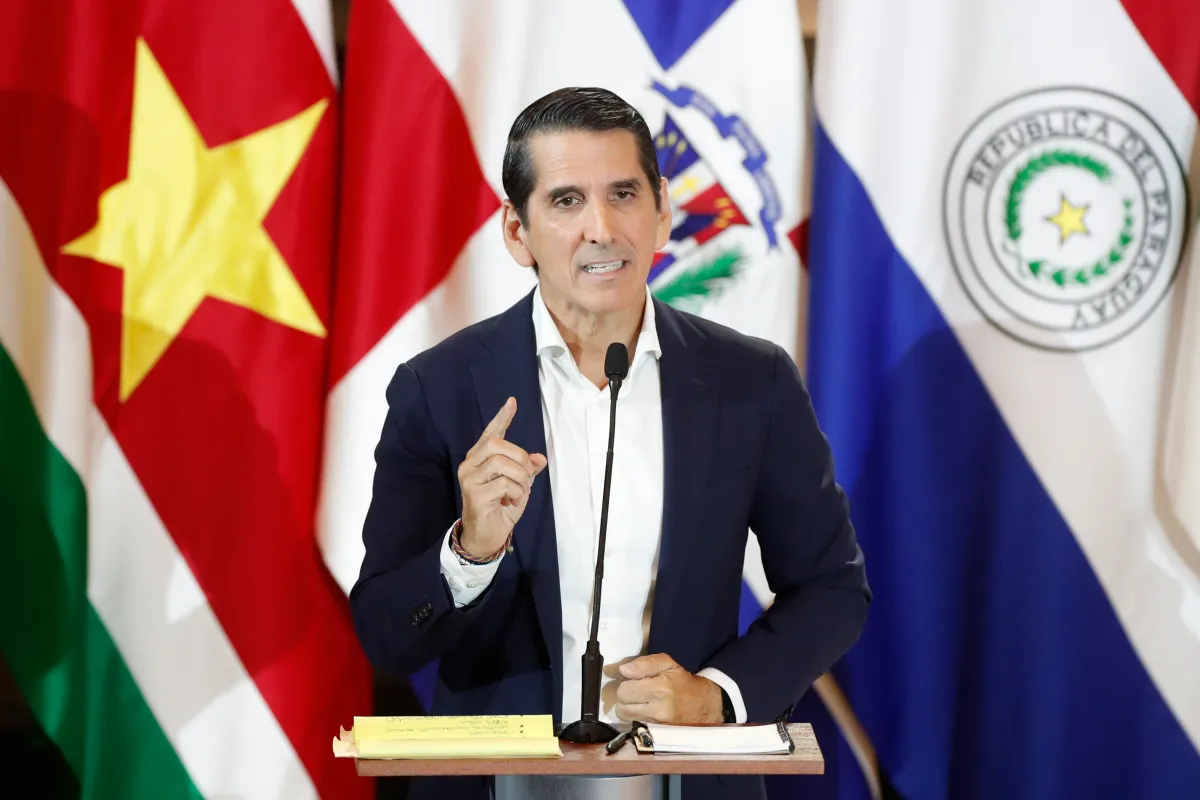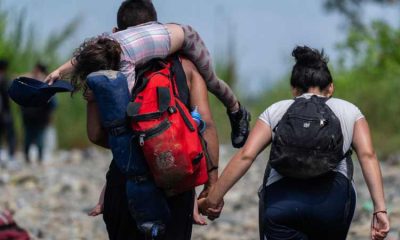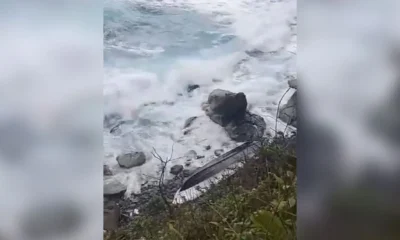International
Rómulo Roux, the presidential candidate who promises a Constituent Assembly to refound Panama

Rómulo Roux, leader and presidential candidate of the opposition Democratic Change (CD) party of Panama and who came second in the 2019 elections, is considered a politician who does not live off the system.
This gives it the power to carry out its main objective: a new Magna Carta that refounded Panama and frees it from corruption.
“I’m not a professional politician, I don’t live off the system, I don’t live on my donors, and that gives me the freedom to make the decisions that the country requires them to be made,” such as changing the Constitution through a constituent assembly,” the lawyer and doctor of law said in an interview with EFE.
Roux, standard-bearer of the traditional CD and Panameñista Party (PPa) and third in the most recent survey published by the newspaper La Prensa, tries again to reach the presidency of Panama with a series of basic columns, including economics, education and the reform of public institutions.
Winning, apart from “punctual” proposals such as creating 500,000 jobs and tripling, up to five million, the number of annual visitors to the country, he intends to leave the change of the 1972 Constitution as one of its “legacys”.
This new legal framework is needed, among others, “to eliminate the number of deputies (71), lower it to no more than 51 deputies and that they cannot raise their own budget when they feel like it, that they cannot take the Executive hostage.”
“Yes (refound), give the country a structure and a new legal framework that eliminates a system that today is made to shield the thugs, to shield corruption, to shield impunity. That system has already collapsed,” said Roux, born in Panama in 1965.
He admitted, however, that cases of corruption such as Odebrecht’s have been of people within the traditional political parties “who have done things wrong.”
But between fleeing “as others have done, one can choose to reform the party, ensure that it operates as it has to operate and that it does things right.”
“Those who want the usual path, the path of politicking, clientelism, malantry, I don’t even want them here,” he remarked.
Roux is fighting for the presidency for the period of 2024-2029 with former president Martín Torrijos (2004-2009) for the Popular Party (PP); the current vice president José Gabriel Carrizo for the Democratic Revolutionary Party (PRD) and the Molirena; and Ricardo Lombana for the Movimiento Otro Camino (Moca) party.
His opponents are also former Minister José Raúl Mulino for the Realizing Goals (RM) collective and the Alianza Party (PA) instead of former President Ricardo Martinelli (2009-2014) – politically disqualified after being convicted of money laundering – and the candidates for the free application Melitón Arrocha, Maribel Gordón and Zulay Rodríguez.
Closely defeated in the 2019 elections by Laurentino Cortizo, Roux recalls that he always said that he “had doubt whether the official result reflected the will of voters at the national level in number of votes in different popular election positions.”
Even so, he now considers that the electoral system at that time “was what it was, and we decided to move forward for five more years, fight and be this May 5 again, to win the presidency.”
In that way, whoever was head of Foreign Affairs and minister for Channel Affairs with Martinelli’s government (2009-2014) points out that nothing distracts him, not even those who talk about his ‘American nationality’, something he denies and assures is a “dirty” campaign that comes from the disabled former president and Mulino, who leads the most recent survey with 29%.
“Why is it me who is attacked the most, if he says that they are flying in the polls? That they attack other candidates. Do they have an ass (fear)?” he said.
Roux, who claims to have his “own polls” and find out what happens while touring the country, affirms that he is not worried about his rivals either, but that it is important is that the Supreme Court of Justice “decide quickly” on the complaint of unconstitutionality against Mulino’s candidacy, “not to remove candidates, but to eliminate uncertainty.”
The lawsuit was filed on March 4 by a lawyer considering that, after the Electoral Tribunal disqualified Martinelli, Mulino’s candidacy is not valid because she was not subjected to primaries and also violates constitutional articles on the election of the president and the vice president of the country.
Among the issues that have marked the debate in the electoral campaign is that of the Cobre Panama mine, of the Canadian First Quantum Minerals (FQM) and disabled by a court ruling last November after massive protests against mining activity.
The issue has persecuted Roux for his relationship with one of the law firms involved in the signing of the first contract of the mining concession, but he responded without hesitation to EFE’s question about the fact that, in case of winning the presidency, things vary and the mine stays to continue operating.
“No, the mine is leaving. The mine is leaving because there is already a ruling from the Court and the people spoke,” he said, but that it must be “closed in an orderly manner and that it does not cost the country anything. Always close it, taking care of the environment.”
International
Thousands rally nationwide against Trump’s threat to U.S. democracy

Thousands of protesters gathered on Saturday (April 19, 2025) in major cities like New York and Washington, as well as in small communities across the United States, in a second wave of demonstrations against President Donald Trump. The crowds denounced what they view as growing threats to the country’s democratic ideals.
In New York City, demonstrators of all ages rallied in front of the Public Library near Trump Tower, holding signs accusing the president of undermining democratic institutions and judicial independence.
Many protesters also criticized Trump’s hardline immigration policies, including mass deportations and raids targeting undocumented migrants.
“Democracy is in grave danger,” said Kathy Valyi, 73, the daughter of Holocaust survivors. She told AFP that the stories her parents shared about Adolf Hitler’s rise to power in 1930s Germany “are happening here now.”
In Washington, demonstrators voiced concern over what they see as Trump’s disregard for long-standing constitutional norms, such as the right to due process.
International
ACLU seeks emergency court order to stop venezuelan deportations under Wartime Law

The American Civil Liberties Union (ACLU) on Friday asked two federal judges to block the U.S. government under President Donald Trump from deporting any Venezuelan nationals detained in North Texas under a rarely used 18th-century wartime law, arguing that immigration officials appear to be moving forward with deportations despite Supreme Court-imposed limitations.
The ACLU has already filed lawsuits to stop the deportation of two Venezuelan men held at the Bluebonnet Detention Center, challenging the application of the Alien Enemies Act of 1798. The organization is now seeking a broader court order that would prevent the deportation of any immigrant in the region under that law.
In an emergency filing early Friday, the ACLU warned that immigration authorities were accusing other Venezuelan detainees of being members of the Tren de Aragua, a transnational criminal gang. These accusations, the ACLU argues, are being used to justify deportations under the wartime statute.
The Alien Enemies Act has only been invoked three times in U.S. history — most notably during World War II to detain Japanese-American civilians in internment camps. The Trump administration has claimed the law allows them to swiftly remove individuals identified as gang members, regardless of their immigration status.
The ACLU, together with Democracy Forward, filed legal actions aiming to suspend all deportations carried out under the law. Although the U.S. Supreme Court recently allowed deportations to resume, it unanimously ruled that they could only proceed if detainees are given a chance to present their cases in court and are granted “a reasonable amount of time” to challenge their pending removal.
International
Dominican ‘False Hero’ Arrested for Faking Role in Nightclub Collapse That Killed 231

A man identified as Rafael Rosario Mota falsely claimed to have rescued 12 people from the collapse of the Jet Set nightclub in Santo Domingo—a tragedy that left 231 people dead—but he was never at the scene.
Intelligence agents in the Dominican Republic arrested the 32-year-old man for pretending to be a hero who saved lives during the catastrophic incident, authorities announced.
Rosario Mota had been charging for media interviews in which he falsely claimed to have pulled survivors from the rubble after the nightclub’s roof collapsed in the early hours of April 8, during a concert by merengue singer Rubby Pérez, who was among those killed.
“He was never at the scene of the tragedy,” the police stated. The arrest took place just after he finished another interview on a digital platform, where he repeated his fabricated story in exchange for money as part of a “media tour” filled with manipulated information and invented testimonies.
“False hero!” read a message shared on the police force’s Instagram account alongside a short video of the suspect, in which he apologized: “I did it because I was paid. I ask forgiveness from the public and the authorities.”
-

 Central America5 days ago
Central America5 days agoPetro questions Ecuador’s vote, cites reports of military control and arrests
-

 International4 days ago
International4 days agoArsenal stun Real Madrid at the Bernabéu to reach Champions League semifinals
-

 International3 days ago
International3 days agoDominican ‘False Hero’ Arrested for Faking Role in Nightclub Collapse That Killed 231
-

 Central America3 days ago
Central America3 days agoNicaraguan Exiles to Mark 7th Anniversary of 2018 Protests with Global Commemorations
-

 International4 days ago
International4 days agoBogotá residents line up for yellow fever vaccine amid national alert
-

 International4 days ago
International4 days agoDeSantis’ immigration crackdown sparks alarm in Venezuelan Communities in Doral
-

 International1 day ago
International1 day agoACLU seeks emergency court order to stop venezuelan deportations under Wartime Law
-

 International4 days ago
International4 days agoMexico refuses to restore ties with Ecuador while Noboa remains in office
-

 Central America1 day ago
Central America1 day agoUN complaint filed against Costa Rica over detention of migrant children
-

 International5 days ago
International5 days agoColombia: Search continues for missing limb of italian scientist found dismembered
-

 International6 hours ago
International6 hours agoThousands rally nationwide against Trump’s threat to U.S. democracy

































